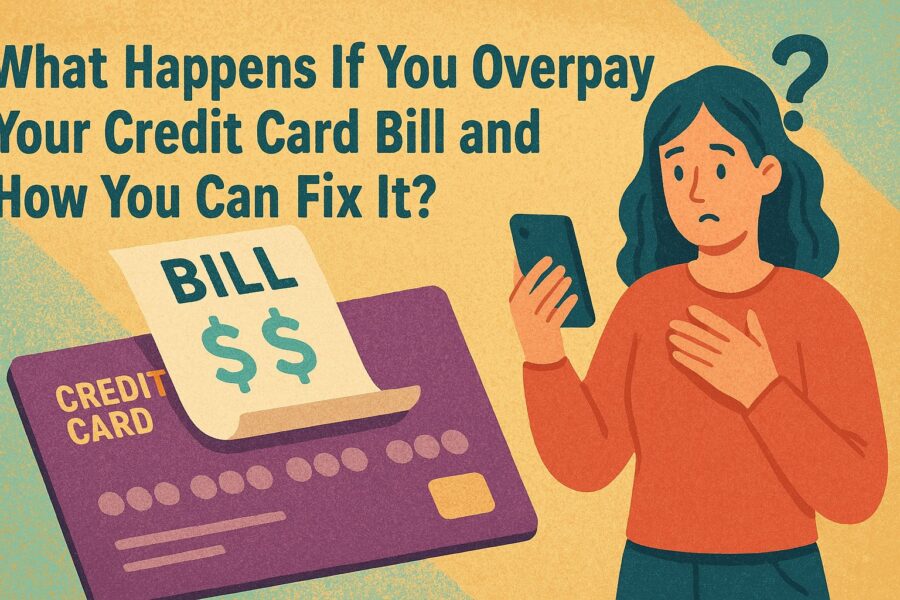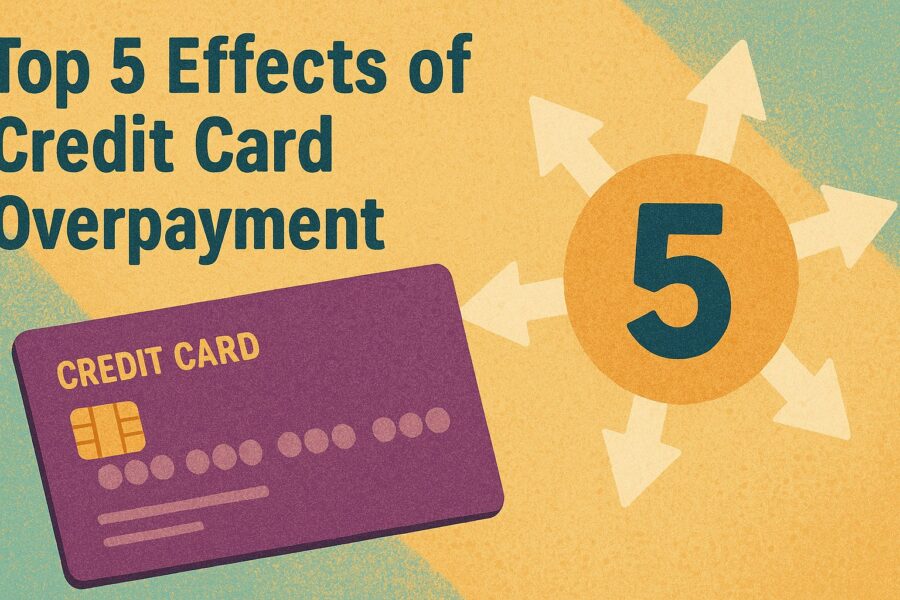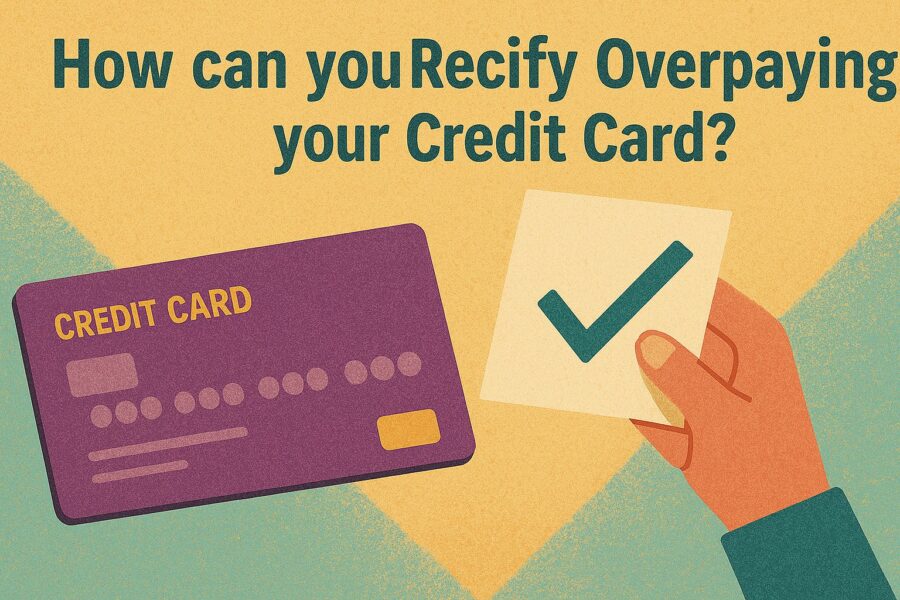What Happens If You Overpay Your Credit Card Bill and How You Can Fix It?
- 23 Oct 25
- 8 mins

What Happens If You Overpay Your Credit Card Bill and How You Can Fix It?
Key Takeaways
- If you wondered what happens if you overpay your credit card bill and if it will affect your credit score, then read on to know how to fix it.
- When you overpay your credit card bill, your account reflects a negative balance (e.g., -₹500), meaning the issuer owes you money instead of the other way around.
- You don’t pay any interest when you have overpaid your credit card bill. Interest only applies to outstanding (positive) dues, not credit surpluses.
- Overpaying a large amount (say, ₹1 lakh) can alert your credit card company, which may temporarily freeze or review your account to rule out money laundering or fraudulent activity.
- Overpaying reduces your overall credit utilisation percentage, which can make your credit profile look healthier and improve your perceived creditworthiness.
- If you’ve accidentally overpaid, you can either request a refund from your card issuer or let the negative balance roll over to your next billing cycle to offset future expenses.
India is rapidly embracing credit usage. In June 2025, credit expenditure rose to 5.5% to ₹1.93 lakh crore (according to RBI). With every household having at least 1 credit card, mistakes are bound to happen.
Overpaying your credit card bills is one of the most common issues raised by users. You can easily fix this by allowing it to roll over the next month. In this guide, we will discuss what happens if you overpay your credit card bill and how you can easily fix it.
Top 5 Effects of Credit Card Overpayment

- You will get a Negative Balance
A negative balance on your credit card does not indicate a bad thing. However, any overpayment shows up on your credit card with a minus sign. For example, if you have paid ₹590 extra, your credit card statement will show -₹590 (if your balance is ₹0). This means that your credit card company now owes you money, rather than the other way around. This can improve your cash flow if appropriately managed.
- Overpayment may trigger a Fraud Alert
Small overpayments typically result in a negative balance. However, if you have overpaid a significant amount (for example, ₹1 lakh), it may alert your credit card issuer. What happens if you overpay your credit card bill by a significant amount is that it issues a fraud alert. Credit card companies classify these as a sign of money laundering and may close or freeze your account to investigate further.
- Credit Utilisation Ratio May Go Down
Credit utilisation indicates whether a borrower manages their credit effectively. The lower the percentage, the better. For example, if you have a credit limit of ₹6,000 and you have utilised ₹3,000 from it, your credit utilisation would be 50%. Now, if you overpay your bill by ₹1,000, your credit utilisation ratio would come down to approximately 33.3%. It showcases that you are a responsible borrower and can positively impact your Rewards Program eligibility in the future.
- No Additional Interest
You may wonder if you need to pay interest rate charges on your negative balance. Interest only applies to the outstanding balance. Therefore, if your account balance is, for example, ₹300, you do not need to pay any additional amount to your issuer.
- No Cancellation of Missed Payments
Overpaying your credit card bill does not erase past missed payments. For example, if you have a missed Card bill payment of ₹500 last month, overpaying ₹500 the next month will not cancel the late entry. However, making timely payments and managing your account credit properly will improve your CIBIL score over time.
How Credit Card Overpayments Occur?
With 11.11 crore active credit card users in 2025, overpayments are a common mistake people make. We know what happens if you overpay your credit card bills. Let’s now see how it can happen.
- Manual Payments
Manually paying your outstanding amount increases the chance of making mistakes. For example, you may have a bill of ₹1,500 on your card, and you accidentally pay ₹5,100. Or you may put an extra 0, resulting in overpayment. Therefore, manual payments often trigger the probability of making mistakes.
- Additional Payments on Top of Automatic Payments
After the introduction of UPI in 2016, tracking credit card bills is easier than ever. The autopay (automatic payments) feature deducts the outstanding amount from your bank account on time. But many people forget or confuse this and make an additional payment, resulting in a negative balance.
- Receiving Refunds
Overpaying your outstanding balance may not always happen from your end. You may pay the correct amount to your credit card company, but get a refund from the merchant afterwards. This can also result in a negative balance on your card.
For example, you pay your credit card balance of ₹2,000 out of your ₹10,000 credit limit. However, you received a refund of ₹500 from a merchant for a return you initiated. Your statement sheet will reflect this as -₹500 (negative balance), or your limit may be increased to ₹10,500 (statement credit).
How can you Rectify Overpaying your Credit Card?

There is no need to panic, thinking about what happens if you overpay your credit card bills. Here are remedies:
- Request a Refund
You can request a refund from your credit card issuer if you have overpaid for your bills. Reach out to your card issuer or bank through their customer service department. Usually, refunds take place within 7-10 days. However, it depends on your credit card company’s discretion.
They will need to verify whether you are the original cardholder. Therefore, make sure to hold onto all documents and transaction receipts. You may also need to provide a written request to your card issuer in some cases.
- Roll Over the Negative Balance to Next Month
Negative balance does not affect your card in a bad way. Therefore, you can allow the balance to roll over to the next month. Let us see how that will affect your outstanding balance.
Suppose you have a credit limit of ₹10,000 on your credit card and a negative balance of ₹1,000. If you use ₹4,000 from your available credit, you will only owe your issuer ₹3,000.
Therefore, if the overpaid amount is small, you can continue using your credit card and adjust it until your next billing cycle.
💡Pay your credit card bills in an easy and secured way and experience smooth transactions with the PICE App.
How to Stop Overpaying Your Credit Card Bill?
- Set up Autopay
Google Pay’s autopay feature lets you automatically pay your credit card bills. You can also utilise their credit monitoring and CIBIL score checker feature. This way, you do not need to worry about late payments or overpaying your outstanding card bills, as GPay will auto-debit your entire payment from your bank account.
- Check Your Account Statement
Regularly check your credit account to detect any fraudulent charges. You can track your payments and also check for any overpayment. If you find any discrepancy, contact your credit card company immediately. You can also check your credit report to detect any activity.
- Account Alert
Many credit card companies have an account alert feature in their mobile apps. You can enable them in the app settings. With this feature enabled, you will receive a notification whenever there is activity on your card.
Conclusion
Knowing what happens if you overpay your credit card bill is crucial to managing your personal finances effectively. Overpayments may indicate a mistake or trigger a fraud warning, but they do not affect your credit score. With proper tracking via Online Banking, Auto Debit, and account credit management, overpaying can be easily resolved without additional interest rate charges or credit card fee burdens.
 By
By 
















